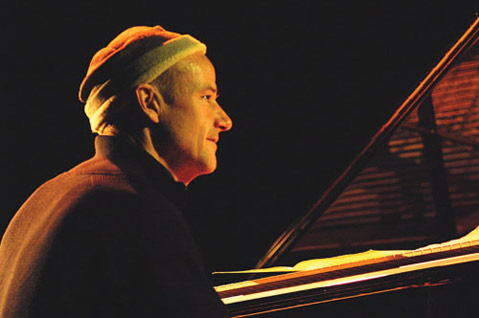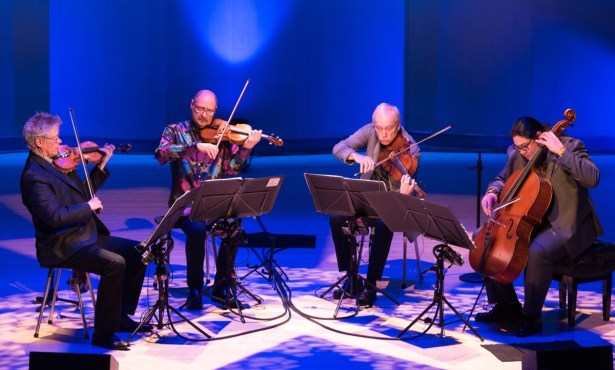More Norwegian Woodard
Fringe Beat Eats Sheep's Head, Hears Music

UPWARD FESTIVITY:In the opening scene of Knute Rockne, All American (featuring Santa Barbara’s own Ronald Reagan as “the gipper”), we see the idyllic lakeside hamlet of Voss, Norway, circa 1893. Wee Knute’s father, then in the Rockne Carriage business, is seeking a better life in America, and the family heads off to Chicago. Of course, socio-economic hardships around the turn of the 20th century-which fueled a mass migration of Norwegians to the U.S.-have long since yielded to a hale state of national health for Norway by the turn of the 21st century.
Since the discovery of oil there in the late ’60s, Norway has become a nation with a high standard of living, and of life. Included in the “life” sector are cultural riches such as a unique take on jazz, and many fine jazz festivals. The first Saturday of the month at the same lake in Voss, the 36th annual Vossa Jazz Festival put on a multi-sensory show, “Ekstremjazz.” The title derives from the collaboration between Vossa Jazz and the other major festival in this town, the “Extreme Sports Week.” As night fell, keyboardist Jon Balke‘s group Batagraf played and dancers danced at lake’s edge, and then onto a float in the water. On the sports side, bicyclists performed gravity-defying stunts and, as a capper, several paragliders embraced gravity, skiing off the mountain high above the town and parachuting down, landing in the lake.
In Norway, clearly, they know how to festival. But the real festival fireworks, of the musical sort, were indoors. The night before his lakefront venture, Balke appeared with a project called Pratagraf, in the Fleischer Hotel, a picturesque and historic hotel next to the train station. Here, Balke and three drummers punctuated and colored the wild comic and verbal gymnastics of Espen Beranek Holm and Are Kalv,. Even someone with scant knowledge of Norwegian (present company alluded to) could appreciate the absurdist virtuosity at work.
On more expected Norwegian musical turf, we heard dream-fine female singers-Solveig Slettahjell, in an impressive and extended commissioned song cycle, and the lovely lyrical singer Silje Nergaard. Popular pianist Tord Gustavsen, he of the soft touch and poetic sensibility, showed up in a duet with clarinetist Carl Petter Opsahl, in the inspiringly ambient quarters of the Vangskyra, the 13th century “stave” church, which miraculously survived the devastating Nazi bombing raid on the town.
Jazz winds from different countries and attitudes entered the programming, as well, though not from America, per se. Wu Fei, the Beijing-born and N.Y.C.-based player of the ancient Chinese instrument known as the guzheng, delivered her fascinating blend of traditional Chinese music and John Cage/John Zorn brand experimentalism.
France was well represented this year, via the powerhouse acoustic sax-led Emile Parisien Quartet and the funny, funky, and madcap Andy Emler Megaoctet. Pianist/leader Emler’s nine-piece “octet” rocked and rolled with a kind of intricate yet free-feeling energy comparable to such large Euro-ensembles as the Willem Breuker Kollektief, the Vienna Art Orchestra, and Corkestra. In the Megaoctet, animated phenom Mederic Collignon, a unique and show-stealing sensation in jazz, was his rubbery self, spewing zany intensity on pocket cornet and voice(s).
Later that night, at the festival’s after-party, the old-school Norwegian folk music band Sver kicked it up, replete with a hardanger fiddle (hardingfele), the centuries-old fiddle with sympathetic strings indigenous to this area. Also indigenous in the hardanger region is the ceremonial smalahove dinner, in which a banquet room in the Fleischer Hotel was used to serve up to VIPs (and a few journalists) a special sheep’s-head-on-a-plate experience. Good eats, good sounds, good times.
FESTIVAL WAKE-UP CALL:Next week, the Primavera Festival settles down at UCSB, the usual/unusual cavalcade of music-and more-in the contemporary and experimental direction. With its subtitle In the Spirit of Henry, this year’s festival is officially dedicated to the late composer Henry Brant, the Pulitzer Prize-winner whose “space music” took him around the world, although he was based in Santa Barbara for the last 25 years of his long life. (ccs.ucsb.edu/primavera).



